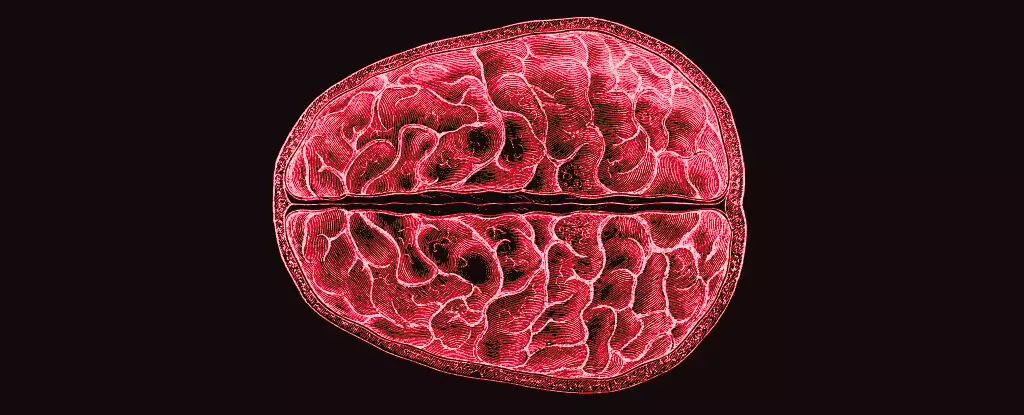Menstruation is often framed as a purely physiological event, yet emerging research reveals that it may wield profound influence over our cognitive faculties and emotional well-being. A groundbreaking study spearheaded by neuroscientists Elizabeth Rizor and Viktoriya Babenko at the University of California Santa Barbara offers tantalizing insights into how the menstrual cycle invokes structural changes within the brain. By meticulously tracking the hormonal fluctuations of 30 women throughout their menstrual cycles, the researchers uncovered compelling evidence that suggests the brain is more plastic than previously thought, reciprocally responding to hormonal rhythms in striking ways.
The study, published in 2023, highlights not only the cyclical patterns of reproductive hormones but also their extensive reach beyond traditional reproductive functions. As the researchers noted, “strong brain-hormone interaction effects may not be limited to classically known hypothalamic-pituitary-gonadal-axis (HPG-axis) receptor-dense regions.” This revelation opens the door to various questions regarding the broader implications of hormonal changes on brain architecture. If menstrual cycles affect brain structure, what does this mean for mood regulation, cognitive performance, and overall mental health?
A Historical Context: The ‘Menstrual Gap’ in Research
Despite being a universal experience for more than half the population, research examining the influence of menstrual cycles on brain function remains astonishingly sparse. Historically, the bulk of scientific inquiry surrounding hormonal impacts on cognitive function has focused primarily on the mechanisms of communication within the brain during specific cognitive tasks. Most studies have overlooked the actual morphological transformations in brain structure that accompany these hormonal shifts. What remains a mystery is why extensive research has not been directed toward this critical issue, especially when the implications can affect millions.
“Cyclic fluctuations in HPG-axis hormones exert powerful behavioral, structural, and functional effects through actions on the mammalian central nervous system,” state Rizor, Babenko, and their team, reinforcing the need for a paradigm shift in research focus. Understanding how hormonal dynamics sculpt the very architecture of the brain can radically redefine our perceptions of women’s health, neurobiology, and mental wellness.
Decoding Structural Transformations: What the MRI Scans Revealed
In a bid to fill this knowledge void, the research team employed MRI scans to scrutinize participants’ brain structures across different phases of the menstrual cycle: menstruation, ovulation, and mid-luteal. More importantly, they measured hormone levels concurrently, allowing for a real-time examination of how these factors intersect.
The findings were illuminating. During the pre-ovulatory phase, characterized by surging levels of 17β-estradiol and luteinizing hormone, the study indicated significant modifications in white matter. Specifically, changes suggestive of accelerated information processing were detected, hinting at an enhanced cognitive capacity during this period. In contrast, as progesterone levels surged post-ovulation, participants exhibited increased brain tissue volume coupled with a reduction in cerebrospinal fluid volume.
This interplay of hormones could have profound implications for our understanding of cognitive performance across the menstrual cycle. It raises a pivotal question: Could women experience heightened clarity or creativity during specific hormonal phases, thus enhancing productivity or emotional regulation? Conversely, if hormonal fluctuations also contribute to variances in mental health, it could explain the puzzling and often debilitating mood shifts some experience throughout their cycles.
Paving the Way for Future Research
The implications of this groundbreaking research extend well beyond the realm of academic interest. It lays a critical foundation for future studies to explore not only the cognitive dimension of menstruation but also how it’s intertwined with emotional disturbances often observed during menstrual phases. Considering the potential link between hormonal shifts and mental health issues—including anxiety, depression, and other mood disorders—expanding our understanding of this relationship is essential.
As society continues to advance toward a more comprehensive understanding of women’s health, research like this illustrates the urgent need for a shift in discourse. Recognizing menstruation as a complex neurobiological event rather than a mere inconvenience will not only empower women but also promote holistic, informed approaches to mental health, paving a brighter path for everyone.


Leave a Reply